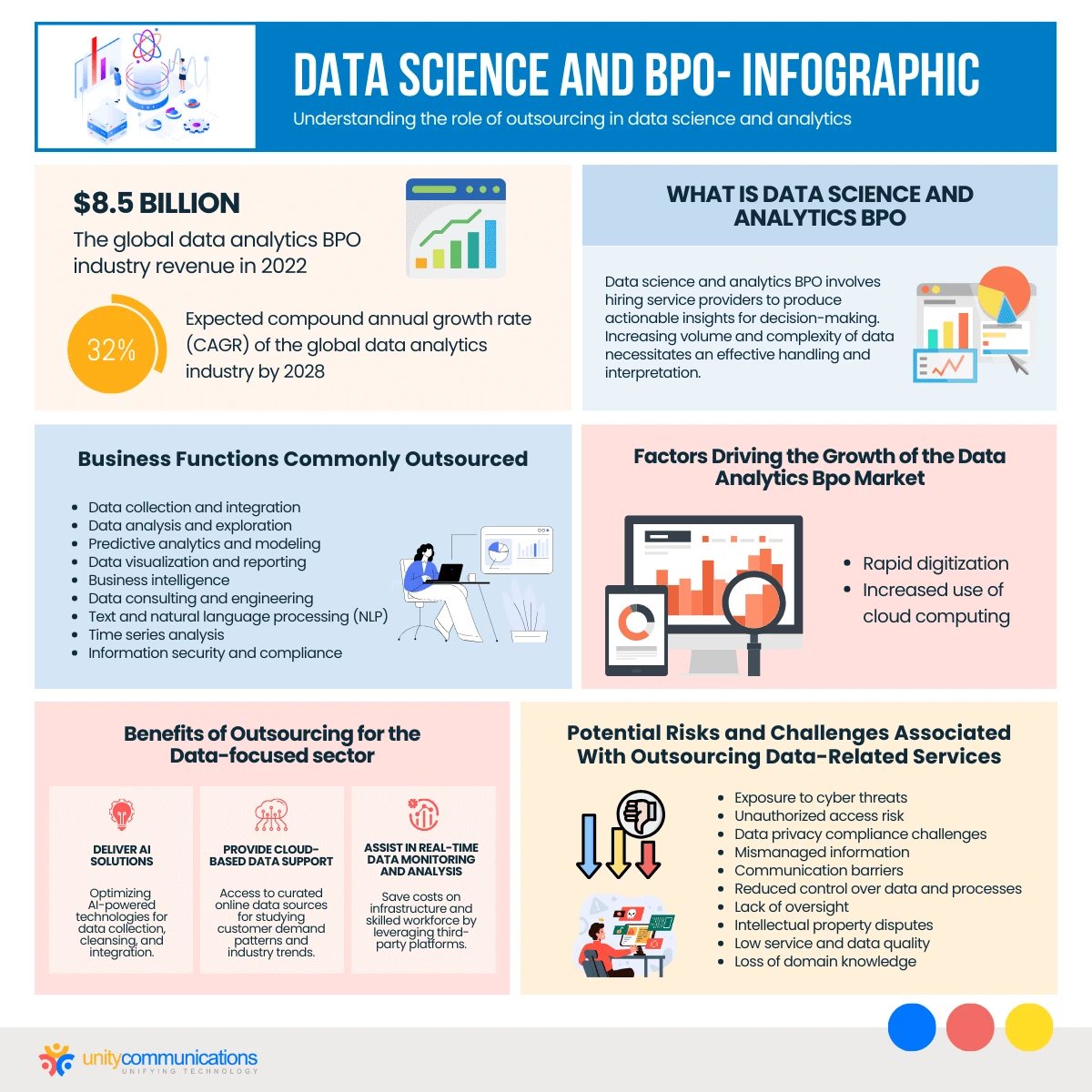Table of Contents
Every online and offline transaction involves the processing of big data. A simple mistype of information leads to complex errors, misinterpretations, and delays. It doubles the time and effort needed to finish related tasks, potentially overworking your in-house staff.
Business process outsourcing (BPO) offers cost-effective solutions to streamline your data collection and management. Service providers leverage diverse talent and automation to ensure speed and accuracy when dealing with datasets.
But how does BPO bring innovation to the data science and analytics sector? What are the benefits and risks of outsourcing your information-related work?
Stay on this page to learn more.
What Is BPO in Data Science and Analytics?

Data science and analytics BPO refers to hiring service providers to harness and produce actionable insights relevant to effective decision-making. This practice has become prominent due to the increasing volume and complexity of data businesses must handle and interpret.
Besides employing highly trained data scientists and analysts, support vendors use various analytics tools to speed up information gathering, processing, and sensing. The findings guide your efforts in streamlining business operations, enhancing your products, and boosting the customer experience.
Here are the common solutions that providers optimize:
- Web scraping tools (e.g., BeautifulSoup, Selenium, and Scrapy)
- Extract, transform, load (ETL) platforms (e.g., Apache, NiFi, and Talend)
- Relational databases (e.g., MySQL, PostgreSQL, and Microsoft SQL Server)
- NoSQL databases (e.g., MongoDB, Cassandra, and Redis)
- Data warehousing (e.g., Amazon Redshift, Google BigQuery, and Snowflake)
- Statistical analysis systems (e.g., SPSS Statistics, Posit, and OriginPro)
- Programming languages and environments (e.g., R, Python, and Jupyter Notebooks)
- Distributed data processing frameworks (e.g., Apache Spark)
- Data visualization tools (e.g., Tableau, Power BI, D3.js, Matplotlib, and Seaborn)
- Business intelligence solutions (e.g., QlikView or Qlik Sense and MicroStrategy)
- Artificial intelligence (AI) and machine learning (ML) tools (e.g., RapidMiner)
- Collaboration and communication platforms (e.g., Slack, Asana, and Microsoft Teams)
- Data encryption solutions (e.g., OpenSSL and BitLocker)
- Data masking and anonymization tools (e.g., Mage Dynamic Data Masking)
- Compliance management software (e.g., TrustArc and OneTrust)
These resources help save costs while ensuring data accuracy during real-time online transactions. As a result, many companies rely on BPO to meet their data science and analytics needs.
This demand led the global data analytics BPO industry to achieve $8.5 billion in revenue in 2022, based on IMARC Group’s latest statistics. The research firm expects the sector to expand at a compound annual growth rate (CAGR) of nearly 32% by 2028.
According to the report, the need to keep pace with rapid digitization and the increased use of cloud computing drive the market’s growth. Hence, businesses are anticipated to continuously entrust the following functions to a third party:
- Data collection and integration
- Data analysis and exploration
- Predictive analytics and modeling
- Data visualization and reporting
- Business intelligence
- Data consulting and engineering
- Text and natural language processing (NLP)
- Time series analysis
- Information security and compliance
How BPO Providers Transform the Data-focused Sector

Outsourcing has significantly contributed to the big data industry, from employing experts to optimizing advanced technologies. This cost-effective practice helps clients boost their productivity and ensure accuracy.
But what is BPO’s specific role in the data science and analytics sector? Let us find out below.
Deliver AI Solutions
Service providers optimize AI-powered technologies to automate data collection, cleansing, and integration from disparate sources. These solutions help automate repetitive processes and minimize data input errors. Third-party vendors combine their AI and BPO tools to perform the following activities:
- Predictive analytics for industry and customer demand forecasting
- Natural language processing (NLP) for sentiment and unstructured text analysis
- Data visualization for interactive dashboard development
- Anomaly detection for data and network security
- Personalized recommendations for increased customer satisfaction
- Client segmentation for targeted research and marketing campaigns
According to OpsRamp’s 2022 report, more than half of 211 executives said automating routine tasks is the most crucial element to winning deals. Hence, hiring service providers gives you a competitive edge without spending much on your non-core processes.
Provide Cloud-based Data Support
BPO companies offer subscription-based cloud services for streamlined data management. They give you access to curated online data sources that assist you in studying customer demand patterns, industry trends, and other significant prospects.
Acquiring third-party cloud solutions lets you avoid the high cost of developing proprietary data collection and storage systems. You do not need to worry about security and hardware maintenance; providers implement critical measures to ensure safe and smooth data operations.
Assist in Real-Time Data Monitoring and Analysis
Service vendors help you track and make sense of massive market data in real time using AI-powered solutions and ML algorithms. Handling such voluminous information requires you to spend more on sophisticated infrastructure and a skilled workforce to ensure accuracy and speed. Fortunately, third-party providers deliver those platforms at competitive BPO pricing.
For instance, your business urgently needs to analyze and moderate any social media content to keep a safe space online. You require tools and several workers to accelerate such tasks. Given your limited budget and timeline, hiring a third-party team is your best option to meet these requirements.
You do not have to spend significant time and funding to find suitable candidates. Besides, you no longer need to allot weeks or months to onboard and train your new hires. BPO providers specializing in data science and analytics can deploy highly qualified workers and modern tools to oversee your social media data monitoring needs.
What to Watch out for When Outsourcing Data-related Services
Outsourcing data-focused services is a strategic move for many businesses. However, it also comes with potential risks and challenges that negatively impact daily operations. Because most BPO processes occur remotely, your confidential data is exposed to cyber threats.
In its latest report, IBM warned that 82% of breaches involved cloud-based data. Hence, you should implement increased visibility and security measures to mitigate potential attacks. Start your effort by understanding these possible BPO pitfalls:
- Outsourcing exposes your data to the risk of unauthorized access.
- Working with offshore or nearshore providers challenges data privacy compliance.
- Mismanaged information results in erroneous analyses and decisions.
- Lingual and cultural differences hinder effective communication and cause delays.
- BPO might lead to reduced control over data and processes.
- The lack of third-party team oversight might affect decision-making and responsiveness.
- The inability to clarify intellectual property rights regarding data might end in disputes.
- Establishing clear contract terms and metrics causes low service and data quality.
- Overreliance on outsourcing might lead to the loss of in-house domain knowledge.
- The lack of a structured data recovery plan makes opting out of a BPO deal complex.
The Bottom Line

BPO plays a critical role in boosting the data science and analytics sector. Service providers help transform the industry by delivering robust technologies. These advanced tools can ease the real-time collection, management, and analysis of massive online data.
Despite the numerous benefits that outsourcing offers, challenges remain when working with support vendors. You need to understand the risks listed above to guide you in developing effective strategies to address them and take advantage of BPO solutions.
Let’s connect if you want to partner with a reliable service provider. Our dynamic team at Unity Communications optimizes modern systems and approaches. These resources ensure the safe handling of sensitive data, especially involving your contact center operations.




